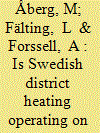|
|
|
Sort Order |
|
|
|
Items / Page
|
|
|
|
|
|
|
| Srl | Item |
| 1 |
ID:
092816


|
|
|
|
|
| Publication |
2009.
|
| Summary/Abstract |
This study investigates the emergence of energy markets by testing for convergence of energy prices with a new dataset on energy spot prices in 35 major cities in China. Both descriptive statistics and unit root are employed to test the convergence of energy prices for each of four fuel price series. The whole study period is divided into two sub-periods in order to reconcile the gradual energy reforms. The results show the steady improvement in energy market performance in China, especially during the second sub-period, which suggests that the market appears to be playing an increasing role in determining energy prices. While panel unit root tests show energy markets are integrated in China as a whole, city-by-city univariate unit root tests suggest that there are still many regional energy markets, probably because energy reserves (especially coal) vary widely across regions. Since China's energy economy is gradually moving towards market-oriented mechanisms, the existing literature may become obsolete soon.
|
|
|
|
|
|
|
|
|
|
|
|
|
|
|
|
| 2 |
ID:
150809


|
|
|
|
|
| Summary/Abstract |
The deregulation of the Swedish electricity market in 1996 made it possible to operate municipal district heating commercially. Until that time district heating had been organized mainly as municipal utilities. After 1996 district heating is instead expected to function on a market. In competitive and integrated markets, prices are expected to be equal, or converging. To find out if district heating operates on an integrated market the differences in price levels, price convergence, price strategy, and business goals, among municipal, private and state owned district heating companies are investigated.
|
|
|
|
|
|
|
|
|
|
|
|
|
|
|
|
| 3 |
ID:
111086


|
|
|
|
|
| Publication |
2012.
|
| Summary/Abstract |
This paper explores price regulation and relative price convergence in the Canadian retail gasoline market. We use monthly data (2000-2010) on retail gasoline prices in 60 Canadian cities to investigate (i) whether the retail gasoline market in Canada has experienced a relative price convergence to the mean, which is expected, given the increased economic integration across Canadian provinces; and (ii) whether the introduction of price regulation mechanisms in New Brunswick and Nova Scotia in July 2006 had any impact on the price convergence in these provinces.
We use a nonlinear panel unit root test and find solid evidence that Canadian retail gasoline markets are well integrated across locales; however, the share of converging cities reveals a significant decline since July of 2006. The impact of price regulation on price convergence is mixed; our results indicate that since the enactment of the regulation in all New Brunswick cities (9) included in the dataset, gasoline prices converge to the national mean. Volatility of price is also significantly reduced. In contrast, in the wake of price regulation in Nova Scotia, all 6 cities of the province are non-convergent to the mean with increased volatility and overall price level.
|
|
|
|
|
|
|
|
|
|
|
|
|
|
|
|
| 4 |
ID:
150347


|
|
|
|
|
| Summary/Abstract |
Long-run dynamics of electricity prices are expected to reflect fuel price developments, since fuels generally account for a large share in the cost of generation. As an integrated European market for electricity develops, wholesale electricity prices should be converging as a result of market coupling and increased interconnectivity. Electricity mixes are also changing, spurred by a drive to significantly increase the share of renewables. Consequently, the electricity wholesale price dynamics are evolving, and the fuel–electricity price nexus that has been described in the literature is likely to reflect this evolution. This study investigates associations between spot prices from the British, French and Nordpool markets with those in connected electricity markets and fuel input prices, from December 2005 to October 2013. In order to assess the time-varying dynamics of electricity spot price series, localized autocorrelation functions are used. Electricity spot prices in the three markets are found to have stationary and non-stationary periods. When a trend in spot prices is observed, it is likely to reflect the trend in fuel prices. Cointegration analysis is then used to assess co-movement between electricity spot prices and fuel inputs to generation. The results show that British electricity spot prices are associated with fuel prices and not with price developments in connected markets, while the opposite is observed in the French and Nordpool day-ahead markets.
|
|
|
|
|
|
|
|
|
|
|
|
|
|
|
|
|
|
|
|
|